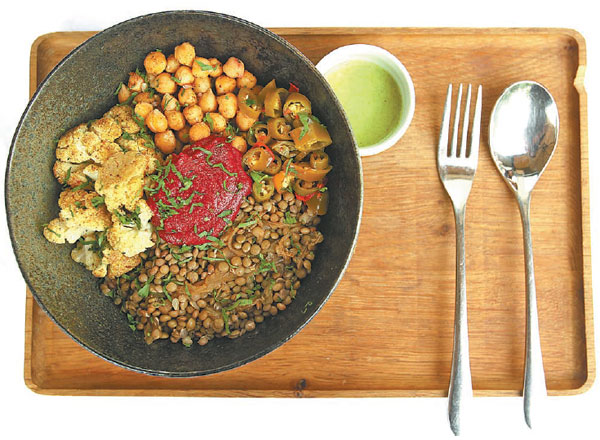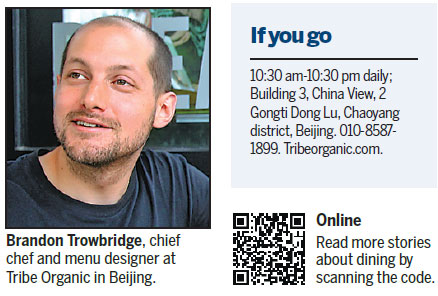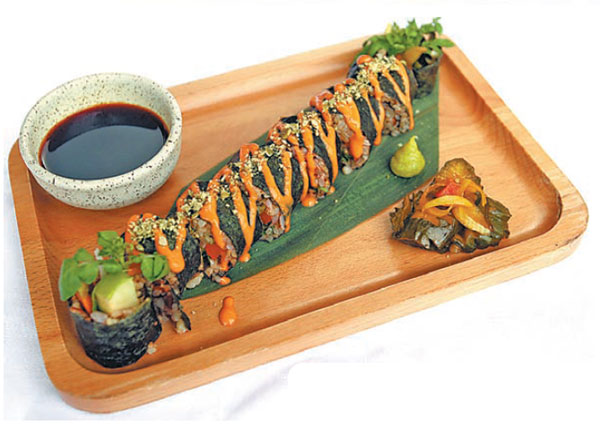Healthy, bite by bite
Updated: 2015-05-26 07:05
By Liu Zhihua(China Daily USA)
|
|||||||||
A popular restaurant in Beijing's Sanlitun keeps customers coming with a smart menu that goes beyond organic ingredients, Liu Zhihua discovers.
It's about 2:30 pm and Brandon Trowbridge is startled by my arrival to interview him. He's totally forgotten about the appointment after a busy morning, and has just started his lunch.
Trowbridge is the chief chef and menu designer at Tribe Organic, a hot spot among Beijing foodies for its healthy and organic fare, which he helped two Chinese women launch in 2014.

|
Israeli lentil bowl (top) features a five-grain base, spiced lentils, pickled peppers, toasted cauliflower and beet hummus. The artful sushi roll (above) is all rice and veggies. Photos by Zhang Wei / China Daily |
He also runs a Southern US-styled restaurant, NOLA, which he helped the owners establish in 2009, one year after he arrived in Beijing.
Born in 1982 in the Mississippi Delta city of New Orleans, the 32-year-old American came to Beijing at age 25 to work in a French hotel as chef de cuisine, after working in fine-dining restaurants in California after his college days.
Prior to that, he'd cooked in small Mexican restaurants during high school to help pay for his college tuition, starting as a vegetable cleaner.
That range of experience helped him see many different ways to cook, and Tribe Organic is quite a demo of such flexibility.
The two-story restaurant has a semi-open kitchen, square tables, handmade chairs and signature terrazzo-tile floors, all ready to serve almost 100 diners in a sitting. The operation runs with a large "family" of about 35 employees.
It has the feel of a crowded and rather noisy cafe: The founders' original idea was to open an organic take-away coffee shop. But Trowbridge's background as a chef prompted a shift away from sandwiches, cakes and drinks to designing quite a large menu of healthy organic food.
"They told me they wanted organic food, but just 'organic food' doesn't make healthy food," Trowbridge says, insisting that being chemical-free isn't enough by itself to make the food healthy.
His menu - salads, main courses, staples and drinks - tries to make everything as nutrient-dense as possible, without empty calories (calories from solid fats or added sugars), such as white flour or sugar, because everything put into the mouth should give the body something that it can use, Trowbridge adds.
In English and Chinese, the menu has items marked that are vegan, vegetarian or gluten-free, and lays out the health benefits, such as healing, high in fiber, antioxidants, and probiotic.
It is also very international, reflecting Trowbridge's life as he travels, eats out, and learns from friends from different countries.
It's a Western-style restaurant, and many of its staff members speak English. The chef recently developed Tribe's own version of xiaomian, a traditional numbingly hot noodle soup from Chongqing, inspired by a friend from the area.
His favorite dish on the current menu is the green-tea cold noodle, adapted from a Korean classic with some simple changes to make it his own version, such as replacing the traditional peanuts with cashews for their health benefits.
One secret to make healthy food delicious, the chef says, is to meld flavors, mixing spicy, sour, bitter, sweet and salty flavors into each dish to make it delicious.
Another secret is using ingredients that are "fresh and as close to raw as possible", he says. The fresher and less processed the ingredients are, the more nutrients will be kept, he explains, adding almost all dishes on the menu feature something raw.
On my recent visit, just as the chef predicted, I liked the green-tea cold noodle very much.
It was ice-cold refreshing, and had a light but pleasant aroma of soybean milk, with plenty of fresh cucumber, kale, pickled radish and sesame.
The noodles got softer as we waited for the photographer to finish taking photos, but they were still very tasty and chewy.
To make the soybean milk used in the dish, the chef soaks the beans in water for more than two days, instead of the usual few hours, until they start to sprout.
The nutrients beans have are mostly protein and carbohydrates, but once they begin to grow, they will have more vitamins inside, Trowbridge explains.
Also, he says, the longer the soaking, the less heat is needed to cook the soybean milk, so fewer nutrients will be destroyed by heat.
The Israel lentil bowl also contains rice that gets a long soak in water, for at least 24 hours until they sprout, before getting boiled for a short time and steamed.
The base underneath is five grains - red rice, brown rice, quinoa, buckwheat and millet - and the topping is spiced lentils, pickled peppers, toasted cauliflower and beet hummus. It is served with green tahini sauce.
The rice is flavored with vinegar and honey; the lentils and cauliflower with turmeric, cumin and fennel; and the beet hummus gets extra zip from lemon and orange juice. The large family of ingredients suggests healthy and nutrient-dense eating.
My favorite dish that day was the "cheesecake" made of raw beets and cashews.
The chef softens the two ingredients by soaking them. Then he smashes the beets and cashews, sweetens the mix with honey, and puts the mixture in a refrigerator for five to six hours before serving with seasonal fruit.
The cashew and beet combine to produce a texture like cheesecake, but provide healthy protein and vitamins instead of fat.
The restaurant has a large menu of drinks, including various fruit juices, and sells coffee made with organic beans and milk at a competitive price.
Tribe Organic also holds seminars focusing on healthy eating every month.
Contact the writer at liuzhihua@chinadaily.com.cn

(China Daily USA 05/26/2015 page8)
Most Viewed
Editor's Picks

|

|

|

|

|

|
Today's Top News
Western US officials tour China to bring business over
Chinese premier arrives in Chile for official visit
John Nash: A life of great struggle and even greater success
Cleveland police say 71 people arrested overnight in protests
US charges a reflection of 'anxiety'
Expansion of free trade possible on Chile visit
Chilean president sees promising prospects for relations with China
Mathematician John Nash killed in car crash
US Weekly

|

|
















